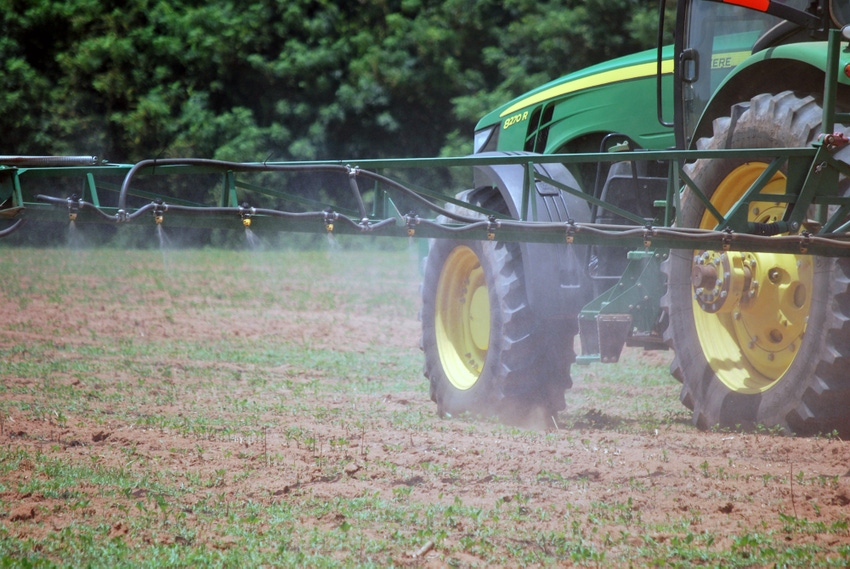
In late November, the Arkansas Plant Board Pesticide Committee held a hearing on two Dow herbicides. On a three-to-one vote, Enlist One, to be used with 2,4-D-tolerant cotton, was recommended out of committee for use in 2018. Following concerns from applicators regarding a portion of the federal label, a recommendation for Loyant, a rice herbicide, was not offered pending potential further action by the EPA.
“Enlist One contains the same 2,4-D choline salt that’s in Dow’s Enlist Duo. It just doesn’t have the glyphosate component as a pre-mix,” says Tom Barber, University of Arkansas weed scientist. “So, it’s the single product — 2,4-D Choline — only.”
The board members, says Barber, were concerned with volatility of the 2,4-D product and wanted to make sure university weed scientists have studied Enlist One. “And we have. They’d already cleared Enlist Duo, and it was available for use last year.”
Scrutiny
Following the mass of dicamba drift complaints, the committee’s cautious approach regarding Enlist One is understandable. Indeed, as a basis for scrutiny the lone no vote cited the desire not to see a repeat of the 950-plus dicamba complaints this year.
“2,4-D has the ability to take out crops in short order,” says Barber. “It’s a shame, but in talking about new herbicide products you can’t put aside what’s happened with dicamba. Everyone is a little shell-shocked and, since cotton is so sensitive to 2,4-D, you can see why there wasn’t a unanimous vote.
“And there are still folks who remember back in 2006 when cotton was drifted on from miles away. 2,4-D was reportedly sprayed into an inversion, and it was carried that far.”
Such events should not be a problem because “the 2,4-D/choline product shows significantly less volatility than the older salt formulations.”
This year, “there were some discussions about 2,4-D damage complaints on cotton with some Enlist Duo applications,” says Barber. “But none of them that were discussed at the meeting had come into the Plant Board but to Dow. The Dow representative went through those physical drift claims up to 300 feet, but the farmer had sprayed when the wind was blowing towards the neighbor. That’s a label violation because it says you can’t spray if (a sensitive crop) is downwind in an adjacent field.”
“We’ve conducted volatility testing on Enlist One using low tunnel experiments and everything appears to look good thus far,” says Jason Norsworthy, University of Arkansas weed scientist. “We did observe slight symptoms on cotton, but the extent of the symptoms were less than the degree of damage to soybean seen from the volatility of Xtendimax and Engenia in the same trial.
Physical drift
“I’d caution against saying anything has zero risk, but based on the work we’ve done, physical drift would seem to be more of a concern than volatility for Enlist One.
“We do know that cotton is extremely sensitive to 2,4-D, and the 2,4-D choline in Enlist One is still 2,4-D and will cause considerable damage to non-Enlist cotton if drifted onto the crop.”
Queried about the Enlist One label, Norsworthy says it is “as I understand it, very similar to the Enlist Duo, with a few exceptions.”
A “positive attribute” Norsworthy notes about Enlist One over Enlist Duo “is the ability to tank-mix with Liberty or other generic glufosinate products (Cheetah, Interline, etc.), allowing two effective modes of action to be applied simultaneously for control of glyphosate-resistant pigweed. Enlist Duo cannot be tank-mixed with glufosinate.”
How much Enlist One might be used in 2018?
“You never really know what will happen with a new product until it goes out on a lot of acres,” says Barber. “Of course, there will be considerably more interest in Enlist soybeans once they receive Chinese import approval. According to company forecast estimates approximately 18 percent of cotton acres could be planted to Enlist cotton in 2018.”
Loyant
The committee also considered Dow’s Loyant, a new rice herbicide. A problem with the label — brought up by Dennie Stokes, an east Arkansas aerial applicator — meant no action was taken.
“As an applicator, I have to worry about what could happen outside the target field,” says Stokes, who also represents state aerial applicators on the Plant Board. “Aerial applicators need to be able to do the job we’re hired and trained to do.
“Let me say this: Loyant is a fine product, and we need it. What we don’t need are any problems right off the bat.”
There were two or three things Stokes wanted the board to address with Loyant. The proposed state label obviously has to follow the federal guidelines, although states can be more restrictive.
“First, I didn’t want the applicators to have the label put us in a box,” says Stokes. “The label as proposed was a bit too restrictive. They had a boom pressure setting that was too low at 30 psi. We want the best droplet size to do the most efficient job, not drift and clean up weeds. Again, that’s our job as aerial applicators, and that’s what we’ve been trained to do.”
To their credit, says Stokes, the regulators and Dow “were agreeable to our points. They understood what the concerns were, and they’re now in the process of making those changes.”
Adds Norsworthy: “There seems to be a question regarding the maximum pressure of 30 psi on the current label. The Pesticide Committee was told droplet studies in the wind tunnel that were sent to the EPA and tank-mix studies of Loyant with Command conducted in Arkansas were at 40 psi. It is my understanding that this is a situation that Dow AgroSciences will try and resolve with the EPA through a possible modification to the label.”
About the Author(s)
You May Also Like




